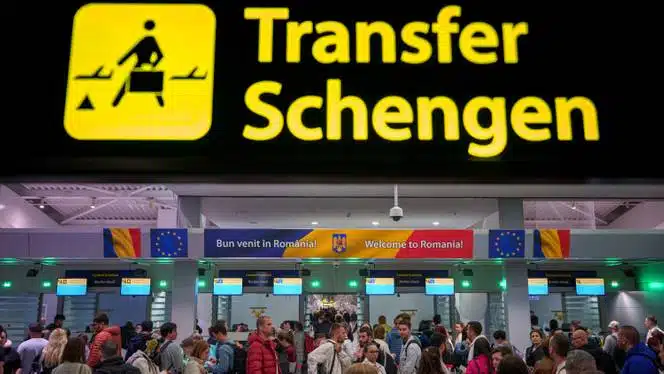Both countries still have land border checks in place even though they meet the technical requirements for full admission.
A new phase in Romania and Bulgaria’s integration with the European Union has been reached with their partial entry into the ID-check-free travel area.
Travelers coming by air or sea from both nations now have free entry to the Schengen area after years of talks.
However, due to resistance, mainly from Austria, which has long obstructed their bid because to worries about illicit migration, land border inspections will continue to be in place.
Ursula von der Leyen, President of the European Union Commission, praised the move, calling it a “historic moment” and a “huge success for both countries” for the largest free travel area in the world.
In 1985, the Schengen Area came into being. It consisted of 23 of the 27 EU members, plus Switzerland, Norway, Iceland, and Liechtenstein, prior to the entrance of Bulgaria and Romania.
Every day, almost 3.5 million individuals enter and exit the EU.
At the end of 2022, Austria denied the admittance of Romania and Bulgaria into the Schengen zone, but granted full entrance to Croatia. 2007 saw the entry of Bulgaria, Romania, and Croatia into the EU.
Complete integration by year’s end
The Associated Press was informed by Romanian member of the European Parliament Siegfried Muresan that it is “an important first step” that will help millions of tourists every year.
“We are entitled to join with the terrestrial border as well—Bulgaria and Romania have been fulfilling all criteria for joining the Schengen area for years,” he stated, adding that it “will offer additional arguments to the last EU member state that has been vetoing the full accession.”
The “well-deserved achievement” for Romania, according to Prime Minister Marcel Ciolacu, will let people travel more conveniently and will boost the country’s economy.
He declared, “By the end of the year, we have a clear and firmly assumed government plan for full accession to the Schengen Area.”
For over ten years, Romania and Bulgaria have been declared to meet the technical requirements for full membership by the European Commission, the executive branch of the EU, which calls for the backing of all member states.
In order to combat illegal migration and cross-border crime, both nations have decided to introduce random security screening at airports and marine crossings.
“Bulgaria will fully join Schengen by the end of 2024,” Interior Minister Kalin Stoyanov informed reporters on Sunday. “We have demonstrated to illegal migrants—and we still do—that they should not travel through Bulgaria to reach Europe.”
Expect lengthy lines at the borders
According to government figures, operations at Bulgaria’s four international airports, which handled close to 11 million people in 2023, could be made easier by the abolition of border controls.
According to airport officials, 70% of all flights are Schengen, with the largest hub being the airport in the nation’s capital, Sofia.
The European Parliament has expressed worries about lengthy lines at the EU’s land borders, the potential effects on trade in the bloc’s single market, and the health and safety of drivers, even though the relaxed laws are anticipated to have a favorable effect on the tourism industry.
Truck drivers frequently find themselves in line for kilometers at Bulgarian and Romanian borders.
According to the Union of International Carriers in Bulgaria, the industry suffers annual losses of tens of millions of euros due to delays.
SOURCE: TRTWORLD






